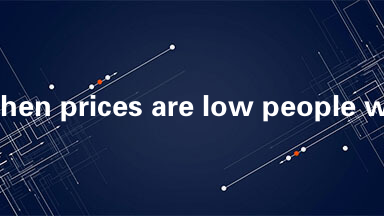
When prices are low people will buy more,and when prices are high they will buy less.Every shopkeeper knows this.But at the same time,producers want higher prices for their goods when they make more goods.How can we find the best price for the goods?The Law of Supply and Demand is the economist’s answer to this question.
According to this law,changes in the prices of goods cause changes in supply and demand.An increase in the price of the goods causes an increase in supply—the number of goods the producers make.Producers will make more goods when they can get higher prices for the goods.The producer makes more shoes as the price of shoes goes up.At the same time,an increase in the price of the goods causes a decrease in demand—the number of goods the consumers buy.This is because people buy less when the price is high.People buy fewer shoes as the price of shoes goes up.Conversely,a decrease in the price causes an increase in demand(people buy more shoes)and a decrease in supply(producers make fewer shoes).
Business firms look at both supply and demand when they make decisions about prices and production.They look for the equilibrium point where supply equals demand.At this point,the number of shoes produced is 3 000 and the price of the shoes is$30.$30 is the equilibrium price:at this price the consumers will buy all of the 3 000 shoes which the producers make.If the producers increase the price of the shoes,or if they produce more than 3 000 shoes,the consumers will not buy all of the shoes.The producers will have a surplus(过剩)—more supply than demand—so they must decrease the price in order to sell all of the shoes.On the other hand,if they make fewer than 3 000 shoes,there will be a shoes shortage—more demand than supply—and the price will go up.
According to the Law of Supply and Demand,the equilibrium price is the best price for the goods.The consumers and the producers will agree on this price because it is the only price that helps them both equally.
41.Why does an increase in price cause an increase in supply?
A.Consumers buy more goods when prices are high.
B.Producers make more goods when prices are high.
C.Producers want to sell all of their goods.
D.Consumers will not buy all of the goods.
42.Why does a decrease in prices cause an increase in demand?
A.Consumers buy fewer goods when prices are low.
B.Producers make fewer goods when prices are low.
C.Producers make more goods when prices are high.
D.Consumers buy more goods when prices are low.
43.What do business firms look at when they make decisions about prices and production?
A.The supply curve.
B.The demand curve.
C.The equilibrium point.
D.All of the above.
44.Why will consumers and producers agree on the equilibrium price?
A.Because it will help them both equally.
B.Because it is the only price for the goods.
C.Because it is the lowest price.
D.Because all of the goods will be sold.
45.When will producers have a surplus of goods?
A.When supply equals demand.
B.When there is more supply than demand.
C.When there is more demand than supply.
D.When they sell all of their goods.








